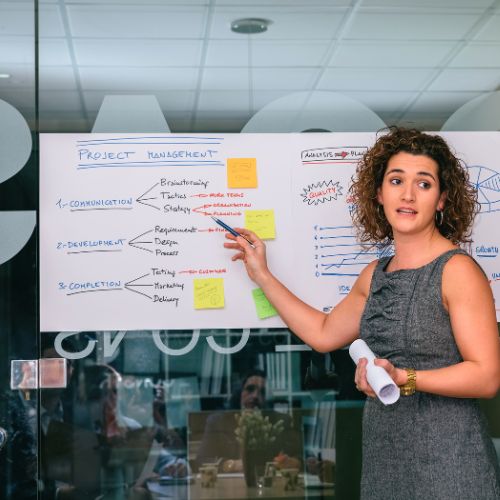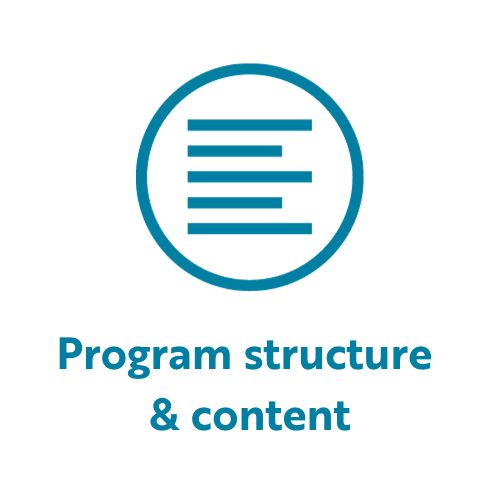

Module 1: Media History & Semiotics
Media history and semiotics is a comprehensive module that delves into the captivating evolution of media through time and the intricate language of symbols and signs within visual communication. The focus on Visual Semiotics offers a profound insight into the language of images, decoding their meanings and cultural significance.
The workshop component on Series Writing and Analysis hones creative skills while dissecting the nuances of storytelling within media.
Additionally, the Theory of Games segment delves into the economic and sociological aspects of game, offering a unique perspective on how games intertwine with society, economics, and human behaviour.

Module 2: Creative process
Module 2 "Creative Process" offers an exploration of two pivotal courses: Design Thinking and the Sociology of Audiences. Design Thinking empowers creative problem-solving through innovative methodologies, fostering a mindset that nurtures unique solutions to complex challenges. On the other hand, the Sociology of Audiences provides profound insights into understanding audience behaviours, preferences, and societal influences on media consumption.
This module synthesizes these diverse perspectives, cultivating a comprehensive understanding of creativity in problem-solving and audience engagement, essential skills in today's multifaceted creative landscape.

Module 3: Audiovisual Production
Module 3 “Audiovisual Production” encompasses two courses: "Intellectual Property" and "The Language of Film and Audiovisual Production." The Intellectual Property course offers a comprehensive understanding of legal frameworks surrounding creative content, safeguarding rights in the audiovisual landscape. Meanwhile, the Language of Film and Audiovisual Production delves into the intricate art of storytelling through visual media, exploring the nuances of cinematic language and production techniques.
Together, these courses equip students with a robust foundation in legal protection and the creative language necessary for successful audiovisual endeavors in today's diverse media landscape.

Module 4: Creation, Development, and Pitching of TV Formats
Module 4, entitled "Creation, Development, and Pitching of TV Formats," consists of three distinct courses: "Global Market Trends and TV Formats," "From Development to Pitch," and "Creating TV Promos."
The course on exploring TV format markets and cultures analysis international market trends. Its focus is on comprehending and predicting viewer expectations and broadcaster/streamer needs. The aim is to create tailored formats with substantial international appeal. Understanding genre subtleties, mastering various TV format types, creation techniques, and drawing inspiration from diverse sources are pivotal aspects covered in this course.
"Marketing Television Formats" centers on strategic methods to effectively pitch original concepts and maximize chances of gaining broadcaster interest.
Finally, "Creating TV Promos" immerses students in practical aspects, emphasizing production techniques, promo creation, and editing processes for these formats.
This module provides students with a comprehensive skill set essential for conceiving, promoting, and securing commission for their TV formats.

Module 5: Project and Team Management
Module 5 "Project and Team Management" centers around the critical skills needed to lead and coordinate within the creative and media industries. This module encompasses effective project planning, team coordination, and leadership strategies tailored specifically to the dynamic and collaborative nature of media projects. It delves into techniques for managing creative teams, handling deadlines, budgeting, and ensuring the successful execution of media-related projects.
This module is instrumental in preparing students for managerial roles within the media and creative industries.

Module 6: Tools and Techniques
Module 6 “Tools and Techniques" is comprised of two fundamental courses: "Introduction to Editing" and "Sound Design and Storytelling. The "Introduction to Editing course lays the groundwork for understanding the essential techniques and principles of editing in media production. It likely covers the basics of editing software, workflow management, and fundamental editing concepts. "Sound Design and Storytelling" explores the intricate relationship between sound and narrative, teaching students how to use sound effectively to enhance storytelling in various media formats.
These courses equip students with practical skills in editing and sound design, essential tools for crafting compelling narratives and content in the media industry.






















